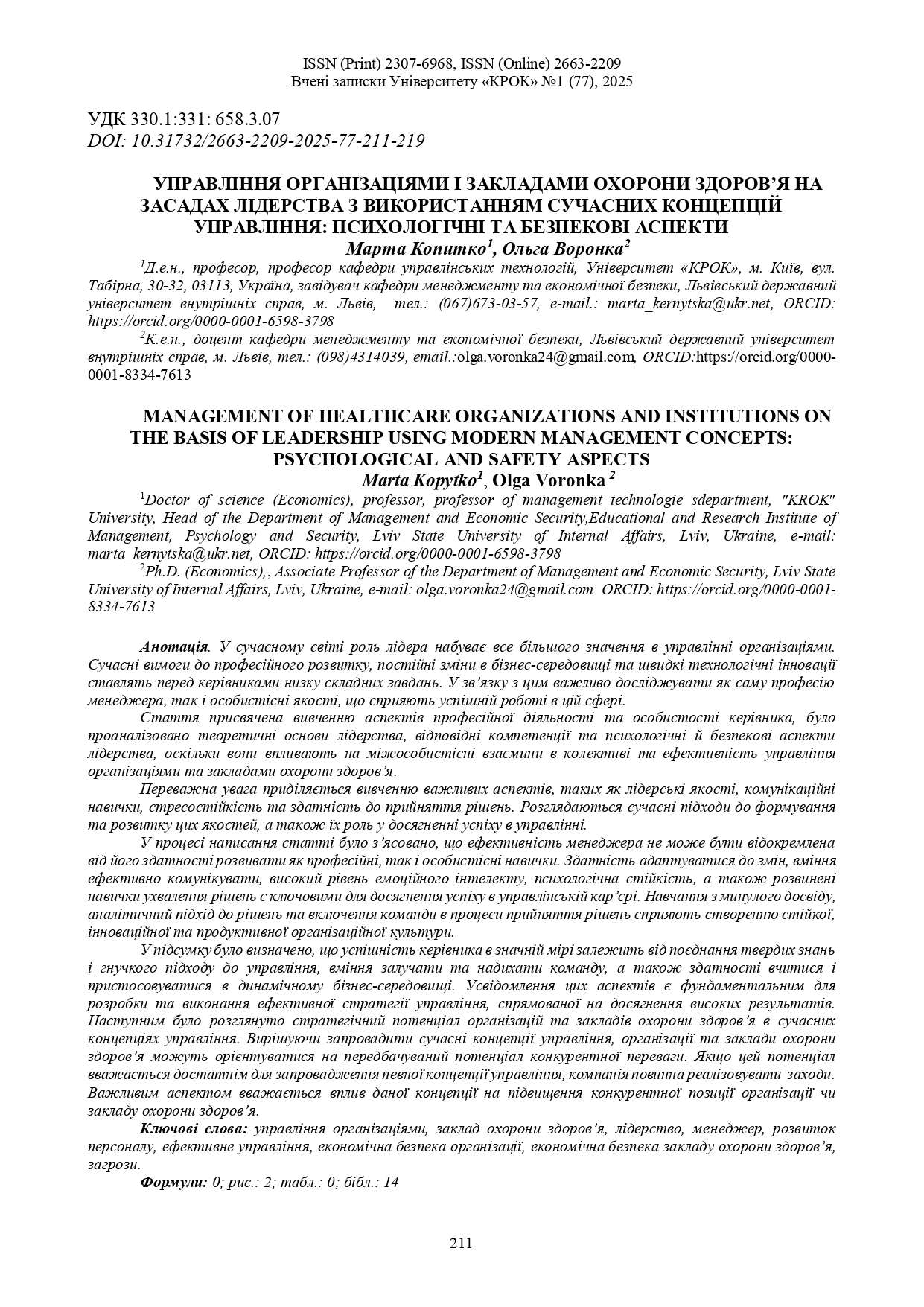MANAGEMENT OF HEALTHCARE ORGANIZATIONS AND INSTITUTIONS ON THE BASIS OF LEADERSHIP USING MODERN MANAGEMENT CONCEPTS: PSYCHOLOGICAL AND SAFETY ASPECTS
DOI:
https://doi.org/10.31732/2663-2209-2025-77-211-219Keywords:
organizational management, healthcare facility, leadership, manager, personnel development, effective management, economic security of the organization, economic security of a healthcare facility, threatsAbstract
Management of organizations and educational institutions is a complex task that requires the coordinated work of many factors and largely depends on the availability of certain resources, key competencies and capabilities of the organization, which are determined by the development of its resource potential. Effective management of the resource potential of enterprises is becoming one of the most priority tasks set by top management within the framework of strategic management of the enterprise, since it is the resource potential that determines its capabilities to achieve one or another goal.
The relevance of this study lies in the need for a deep understanding of the role of leadership and its impact on the effectiveness of organizational management. In the context of globalization and the technological revolution, the features of managerial activity and the ability to effectively respond to changes are becoming key to ensuring the competitiveness and sustainability of organizations. Also important is the analysis of the psychological and economic aspects of leadership, since they affect interpersonal relationships in the team and the effectiveness of management of organizations and educational institutions.
The main attention is paid to the study of important aspects such as leadership qualities, communication skills, stress resistance and decision-making ability. Modern approaches to the formation and development of these qualities are considered, as well as their role in achieving success in management.
Downloads
References
Ареф’єр, С. (2020). Ґенеза розвитку лідерства в управлінні економічними інтересами підприємства. Електронне наукове фахове видання «Адаптивне управління: теорія і практика» Серія «Економіка». Вип. 9 (18). С. 1-20.
Друкер, П. (2018). Ефективний керівник / Пер. з англ. Р. Машкової. Київ : Вид. група КМ-БУКС. С. 248.
Дєгтяр, А., Бублій, М. (2020). Співвідношення понять «керівництво» та «лідерство» в управлінні сучасною організацією. Лідер. Еліта. Суспільство = Leader. Elite. Society. № 1. С. 52–63. URL: https://repository.kpi.kharkov.ua/handle/KhPI-Press/50061
Линьов, К. О. (2016). Лідерство у контексті еволюції підходів до осмислення феномену в освіті. Science Rise: Pedagogical Education. Volume 8 (4). С. 29-34.
Осовська, Г.В. (2003). Основи менеджменту: навч. посібник для студентів вищих навчальних закладів. К.: Кондор, 556 с.
Попрозман, О.І. (2008). Мотивація персоналу на підприємствах. Формування ринкових відносин в Україні. № 9. С. 139-142.
Харчишина, О.В. (2014). Мотивація персоналу на основі теорії організації культури. Економіка. Управління. Інновації. № 1(11). С.26-39.
Скібіцька, Л. І. (2010). Організація праці менеджера: навч. посібник. К.: Центр учбової літератури. 360 с.
Хміль, Ф.І. (2003). Основи менеджменту: Підручник. К.: Академ вид-во, 2003. 608 с.
Копитко, М.І., Михаліцька, Н.Я., & Верескля, М.Р. (2021). Корпоративна культура як стратегічний напрям управління підприємством в умовах сучасних викликів. Вчені записки Університету "КРОК". № 2 (62). С. 83-89. https://doi.org/10.31732/2663-2209-2021-62-92-99
Копитко, М.І., & Завербний, А.С. (2022). Проблеми і перспективи формування конкурентоспроможності вітчизняних промислових підприємств та вплив на його рівень системи управління персоналом. Науковий погляд: економіка та управління. № 4. С. 63-68. DOI: https://doi.org/10.32782/2521-666X/2022-80-9
Копитко, М.І., & Маланчук, А.М. (2024). Соціально-психологічне управління підприємством в умовах сталого розвитку та негативного впливу сучасних загроз. Вісник науки та освіти. Вип. № 1(19). С. 1576-1586 https://doi.org/10.52058/2786-6165-2024-1(19)-1576-1586
Fink, D. A. (2003). Life Cycle Approach to Management Fashion: An Investigation of Management Conceptsin the Context of Competitive Strategy. Schmalenbach Bus Rev. Vol. 55. PP. 46-59. https://doi.org/10.1007/BF03396665
Grzesik, K. (2010). Przywództwo a współczesne koncepcje i metody zarządzania przedsiębiorstwem. Prace Naukowe Uniwersytetu Ekonomicznego we Wrocławiu. nr 89. S. 62-70.

Downloads
Published
How to Cite
Issue
Section
License

This work is licensed under a Creative Commons Attribution-NonCommercial 4.0 International License.

